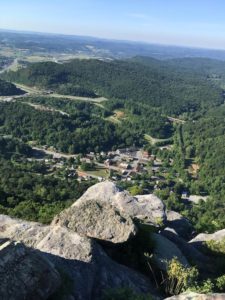Michael Amos Cody's Blog, page 17
June 30, 2018
A Brief Relation of My Individual Smoke-Out, 30 June 2001
I’m not sure how long I smoked cigarettes. Probably since the 8th grade, however old I might have been at that point. Maybe cousins from Michigan smoked. Certainly John Deaver, a new kid at school that eighth-grade year smoked. I got into it somehow.
Like most, I guess, I got caught after a fairly short period of sneaking cigarettes. I remember sitting on the front porch with Mom, who basically said that, since your dad smokes, we can’t really tell you not to, but we’ll never by cigarettes for you.
Perhaps one of the stupidest things I ever did was related to smoking. Our JV basketball team played one winter night at another school — could have been Erwin High or Pisgah High. After our game, while the girl’s were playing, I went outside and walked around the parking lot, testing the doors of cars and trucks, looking for one that was unlocked so I could sneak the use if its cigarette lighter. I think I eventually found one and had my smoke, but somebody saw and reported me to my coach — Johnny Fisher, I think. I had to run a bunch of laps. Thinking back on it, I see now that was many worse things could have happened as a result of such stupidity.
I remember smoking in restaurants. I even remember smoking in the classroom at Mars Hill College in the late ’70s. I remember smoking on airplanes. We smoked about anywhere we decided to back then, except church — I don’t remember ever smoking in church.
Smoking seemed to be part of my writing process. I often sat somewhere — a kitchen table, 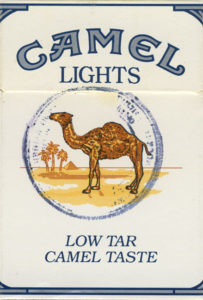 perhaps — with my guitar in my arms, my pencil in one hand and a burning cigarette in the other. When smoking outside became a thing, a requirement, I spent valuable writing time, telling myself I was thinking, standing outside in rain or shine or heat or cold or day or night, smoking.
perhaps — with my guitar in my arms, my pencil in one hand and a burning cigarette in the other. When smoking outside became a thing, a requirement, I spent valuable writing time, telling myself I was thinking, standing outside in rain or shine or heat or cold or day or night, smoking.
I never was really that fond of smoking. I wasn’t crazy about the taste, which lots of smokers claim to like. I didn’t like the smell of it — on me or in ashtrays. I grew to hate the litter of butts that was everywhere. At a certain point, I refused ever to throw down a cigarette or toss one from the car. Wherever I was, I flipped the burning tip off and put the butt in the trash or in my car’s ashtray.
Seventeen years ago, in 2001, June 30 also fell on a Saturday. Leesa, Raleigh, and I had spent the year in Murray, Kentucky, where I had my first tenure-track job at Murray State University. In late May or early June, we moved back to Asheville in preparation for moving to Johnson City, Tennessee, where I would begin my second tenure-track job at ETSU in August. But first, I had to leave the family and return to Murray for five weeks, where I was to teach a summer course.
On that Saturday morning, I left our house in Arden, North Carolina, south of Asheville. I drove out Airport Road and stopped at a convenience store just to buy a pack of cigarettes before I got on I-26 to begin the long drive to Murray. I smoked on 1-26. I smoked on I-40 in North Carolina and Tennessee. I smoked with my friends Mark Chesshir and jb during a stopover in Nashville. I smoked on I-24 in Tennessee and Kentucky. I smoked through the Land Between the Lakes.
 I smoked the last of the pack — a yellow box of American Spirits — as I drove into Murray late that night. I would be staying the first few nights at the home of my MSU colleague Warren Edminster, who, along with Laurie and his three daughters, would be out of town for a few days. Because of the girls, it was a no smoking house. (I remember Warren and Laurie saying that they were going to start smoking again when they turned 70.) Add to that, no place in Murray sold those yellow boxes of American Spirits.
I smoked the last of the pack — a yellow box of American Spirits — as I drove into Murray late that night. I would be staying the first few nights at the home of my MSU colleague Warren Edminster, who, along with Laurie and his three daughters, would be out of town for a few days. Because of the girls, it was a no smoking house. (I remember Warren and Laurie saying that they were going to start smoking again when they turned 70.) Add to that, no place in Murray sold those yellow boxes of American Spirits.
So, I quit smoking. Just like that.
June 22, 2018
Nomination!
On Thursday, 21 June, the first day of summer (I think), Andy Reed from Pisgah Press got in touch to tell me know that Gabriel’s Songbook has been nominated for the 2018 Thomas Wolfe Memorial Literary Award! I haven’t often fared well in situations like this (competition contexts, I mean), but as we’ve all heard it said, “It’s an honor to be nominated!”
From the Western North Carolina Historical Association’s website:
Originated by the Louis Lipinsky family and now also supported by Michael Sartisky, PhD, and the Thomas Wolfe Memorial Advisory Board, the Award has been presented annually for printed works that focus special attention on Western North Carolina since 1955 when the WNC Historical Association and the Lipinsky family of Asheville presented the first Thomas Wolfe Memorial Literary Award to Wilma Dykeman for The French Broad.
Mountain Heritage Literary Festival, etc.
On Friday, June 15, I spent the morning driving from Johnson City and East Tennessee State University to Harrogate, Tennessee, and Lincoln Memorial University. The 13th Mountain Heritage Literary Festival took place over that weekend. It was my first time to attend such an event, my first time to lead a fiction workshop.
I had five good folks in the workshop–Sue, Rebecca, Sam, Luke, and Mike. I decided to call it “Song Scenes.” I’d selected a handful of narrative verses from songs I like. We began with the first verses of Springsteen’s “Thunder Road,” McDill’s “Good Ole Boys Like Me,” and Carpenter’s “He Thinks He’ll Keep Her.” We discussed the narrative elements — how (and what) the writers of these songs achieved in such a short space. Their overnight assignment was to take a verse I handed them and 1) figure out how it works, just like we’d done in class, and 2) write something of their own in which they attempted to evoke the same narrative ambience using some or all of the same elements. All five of them came up with terrific stuff, and I was so pleased with their work and their discussions. Thankfully, they seemed to enjoy the workshop as well, so maybe I’ll get to do this again someday.
The whole weekend was great! During the day, we had the workshops, special events (presentations, performances, and so on), and when everything was finished in the evening, many of us gathered on the dormitory’s patio with guitars and other instruments and beverages in red or blue Solo cups, enjoying the company until late.
One view from Pinnacle Overlook near Cumberland Gap
Morning hike, Saturday, 16 June 2018
May 31, 2018
GABRIEL’S SONGBOOK, Reviewed by CHAPTER 16’s Tina Chambers
Through a Great Wilderness / Chapter 16: A Community of Tennessee Readers, Writers & Passersby / 23 May 2018
It’s a very old tale—boy meets girl; boy trades girl for a shot at fame; boy comes to regret that last part. Gabriel’s Songbook, a debut novel by Johnson City author Michael Amos Cody, is a love song to music—creating it, performing it, and generally being passionate about it. What it is not is a love song to the music business.
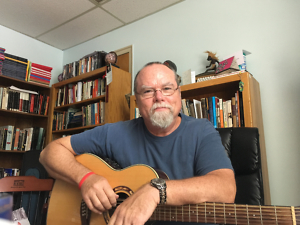 Twenty-one-year-old Gabriel Tanner leaves his new wife, Eliza, and his little hometown near Asheville for the chance to prove himself in Nashville. He’s hoping for a big break, but reality sets in as soon as he arrives: “Young men with guitars awaited country music stardom on every corner, warbling songs about trucks and alcohol and mamas and cheating hearts, guitar cases opened at their feet. Grungy kids Gabriel’s age or younger, looking both frightened and defiant, one moment weaved and bobbed through the starry-eyed sidewalk crowd like the children they were, the next disappeared into some black hole of a bar.”
Twenty-one-year-old Gabriel Tanner leaves his new wife, Eliza, and his little hometown near Asheville for the chance to prove himself in Nashville. He’s hoping for a big break, but reality sets in as soon as he arrives: “Young men with guitars awaited country music stardom on every corner, warbling songs about trucks and alcohol and mamas and cheating hearts, guitar cases opened at their feet. Grungy kids Gabriel’s age or younger, looking both frightened and defiant, one moment weaved and bobbed through the starry-eyed sidewalk crowd like the children they were, the next disappeared into some black hole of a bar.”
Gabriel’s Songbook chronicles the talented-but-naïve young musician’s ups and downs with a vast array of music-business figures: managers, producers, label executives, promoters, engineers, disc jockeys, contract lawyers, marketing consultants, bandmates, writing partners, hair stylists, and wardrobe consultants. They all have big plans for him, but eventually he comes to understand that they’re all working their own angles, which are not necessarily to his benefit. Through it all, Gabriel works hard to remember why he’s doing all this, and what he’s given up along the way. He goes back to the night he saw the new girl at their high school in the crowd at one of his shows:
In the purity of that moment—filled with music and Eliza—I discovered a light. A guiding star, as I’ve always imagined it. Over the years, even in times when I felt most earth-bound, I kept sight of that star in the heavens. When I sat in some darkened room with my guitar in my arms, trying to fit words to music, it hovered above me like a muse invoked. And when I finally got a real stage and an audience made up of more than friends and family, it became a spotlight, or the spot-lit reflection of myself in some pretty woman’s smiling eyes. I followed that star … without question, through a great wilderness and some of my wildest dreams.
Such dreams don’t always survive the trip, though Gabriel’s love for music endures: “This part, the writing of lyrics, I loved most of all about songwriting, even on this edge of exhaustion,” he remembers. “The soul churning. The stirring up of memories and feelings and dreams. The strange sensation that I was a bystander watching as the page filled with these things put into words.”
Through flashbacks, dream sequences, song lyrics, and even ghostly visitations, readers can watch Gabriel learning lessons the hard way, as he is transformed from a romantic idealist into a hard-drinking, hard-living “almost was,” often at odds with family and friends. Cody brings to life Gabriel’s passion for his art and his ambition to succeed in music, deftly portraying the anguish of unrealized dreams made even more bitter by regret.
 A graduate of Auburn University, Tina Chambers has worked as a technical editor at an engineering firm and as an editorial assistant at Peachtree Publishers, where she worked on books by Erskine Caldwell, Will Campbell, and Ferrol Sams, to name a few. She lives in Chattanooga.
A graduate of Auburn University, Tina Chambers has worked as a technical editor at an engineering firm and as an editorial assistant at Peachtree Publishers, where she worked on books by Erskine Caldwell, Will Campbell, and Ferrol Sams, to name a few. She lives in Chattanooga.
May 17, 2018
What’s Next?
Now that the 2018 spring semester is over and I’ve gotten past the always-surprising empty feeling of not knowing what to do with nothing much to do, I’m starting to think about what’s next.
Teaching: That’s easy. This summer I’ll teach ENGL 2110: American Literature I in Summer I and ENGL 3956: Fairy Tales for the Ages in Summer II. Then in Fall 2018, I’ll teach ENGL 4012: American Novel (Gothic Edition), ENGL 5500: Nineteenth-Century American Poetry, and ENGL 5950: Methods of Research. I’ll also direct one honors thesis. So, that’s the rest of the year taken care of as far as teaching goes.
Academic Writing (Scholarship): Co-editors Robert Battistini and Karen Weyler and I will, I hope, complete the editing of The Literary Magazine and Other Writings, 1801-1807, Volume 3 of The Collected Works of Charles Brockden Brown. I have a number of projects that I’ll eventually go ahead with, but I don’t feel pressured to do so in the immediate future. I want to write an essay on a little known early American poet named Samuel Joseph Smith. I will complete (and attempt to publish) an edition of a little remembered nineteenth-century American novel by Catherine Ann Warfield titled The Household of Bouverie; or, The Elixir of Gold (1860). I would eventually like to write and publish a significant essay or a monograph on American Indian literature.
Creative Writing: I’m three short stories away from completing a twelve-story collection tentatively titled A Twilight Reel. The collection is a made up of often interrelated stories that take place over a year in Runion, Madison County, North Carolina, my “little postage stamp of earth.” Each of the twelve stories takes place in a different month in 1999. I’ve completed drafts of the stories for January, February, March, April, July, August, September, October, and November. So, most every day this summer, I’ll be working on the stories for May, June, and December, each of which is in some stage of drafting.
I have some significant work done on two different novels: A Summer Abroad and Antaeus. Although the latter is the more advanced — at over 230 pages so far — I recently realized that this should probably be the third in a group of novels featuring a character currently named Ezra MacRae. As a result of this realization, I’m also beginning another novel — tentatively titled Chart Hits — to be the first featuring MacRae. Not sure how that will play out. The other piece, A Summer Abroad, is based on the summer of 1979, which I spent traveling around Europe with AESU 616.
Finally, I have a batch of (mostly) new songs that I hope to recored together as a new album sometime in the next year. One song, “Freedom, Love, and Forgiveness,” is older — from the 1990s — but in recent years it has been revitalized as Leesa and I sing it together. A new song that seems to be grabbing people’s attention is “Complaints.” A couple of songs grew out of lines that Gabriel Tanner writes in Gabriel’s Songbook; I liked the fragments I wrote for the novel, so I fleshed them out in to full songs: “Siren, Sing” and “Catch That Train.”
I guess I’m planning like I’m in my thirties, even though I’ll turn sixty this year. I’m certainly happy to have accomplished all I have so far, but chasing all these other projects seem to keep me vital and happy.
April 23, 2018
“Fiesta”
April 22 is the anniversary of the 1983 release of my one-and-only 45 rpm single. It was “Fiesta.” This year’s anniversary was the 35th. I find it difficult to realize that at fifty-nine years old, thirty-five years was over half a lifetime ago for me.
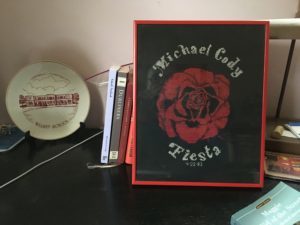 My aunt Ernie (aka Ernestine Plemmons) made this cross-stitch piece for me sometime after the release of the record, probably for my November birthday or for Christmas in ’83. It sits on my home desk (although not in this exact position). The artwork is that of the record’s cover sleeve. A similar rose also appears on the record’s label.
My aunt Ernie (aka Ernestine Plemmons) made this cross-stitch piece for me sometime after the release of the record, probably for my November birthday or for Christmas in ’83. It sits on my home desk (although not in this exact position). The artwork is that of the record’s cover sleeve. A similar rose also appears on the record’s label.
A few years ago I was playing at Good Stuff in Marshall, in its original location, and a forty-something-year-old girl, whose name I don’t remember and whose self-control was beered-up and loose, started calling out for “Fiesta.” (She called out other things as well, but I’ve chosen to forget them.) Anyway, I started the song and got a few lines into it, when suddenly my memory ran out of the chords. I couldn’t remember it. My only actual record release . . . and I’d forgotten how it went.
That night I could only shrug and move on to another song, but within a couple of days, I’d 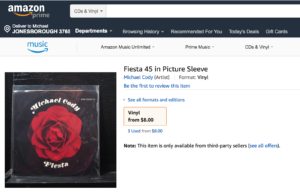 relearned it. Now I usually include it in all my solo shows, and it’s fun to play. And I know of at least one person for whom it’s a favorite.
relearned it. Now I usually include it in all my solo shows, and it’s fun to play. And I know of at least one person for whom it’s a favorite.
In my novel, Gabriel’s Songbook, the story of the writing of the song “Lacy” is the story of another of my early songs called “Daisy.” (I was looking for something that worked like the word Daisy and used Lacy long before I knew somebody by that name.) But the novel’s story of the record release of “Lacy” is the story of the release of “Fiesta” and the non-release of the album that was to follow.
Given that I probably wrote the song a year or two before its release on 22 April 1983, the song is maybe thirty-seven years old. And while the recording is nostalgic and out of date, the song has held up fairly well, I think. I can only hope that its writer has done so as well, but then again, I’ve got about twenty-two years on it!
April 8, 2018
ETSU Creative Writing Festival
On Tuesday and Wednesday of this week, ETSU will celebrate creative writing with a two-day festival that will include readings and workshops from visiting writers Bianca Lynn Spriggs (poetry), Courtney Stevens (young adult fiction), and Mark Powell (fiction). Topping off the festival on Wednesday evening (April 11th) will be a reading by the talented Joy Harjo. Having discussed a number of Harjo’s poems in my Native American Literature class over the past few years, I’m thrilled to get the opportunity to hear her read in person. I have a book of her poetry–She Had Some Horses–that I hope to get her to sign.
The Joy Harjo event is the sixth annual installment in the Jack Higgs Reading Series and will take place in the Culp Auditorium on the ETSU campus. The event is free and open to the public. (If you’re a friend of mine in North Carolina instead of Tennessee, I believe that Harjo will read the following night–Thursday the 12th–on the campus of my alma mater, the University of North Carolina at Asheville.)
I’ll be reading from Gabriel’s Songbook at 11:00 on Tuesday morning (the 10th). At readings so far, I’ve read mostly from the “Delbert Gunter” sections of the novel. This past weekend at City Lights Bookstore in Sylva, North Carolina, I tried out a reading taken from Chapter 7: The Songbird, which seemed to go well, so that’s probably what I’ll read on Tuesday.
I was happy to see one of my professors from Western Carolina University at City Lights. Dr. Jim Nicholl came for the reading and we were able to catch up some on the past twenty-plus years. (I completed my MA at WCU in August 1995.)
I enjoyed seeing Dr. Nicholl, but, of course, part of the catching up was learning the sad news that one of my favorite profs, Dr. Hal Farwell, walked on just within the last few months. I have a couple of favorite memories related to Dr. Farwell. One is seeing him with my son Raleigh at a graduate program party somewhere in Arden (south of Asheville), I think. Somehow Raleigh latched on to Dr. Farwell and drew him into some imaginative adventure in our host’s backyard. The only thing I remember about it was Farwell’s being “my leader” to Raleigh’s character. Another memory is from a few years later, when I was back at WCU, teaching in a visiting position and trying to get started on my dissertation. Farwell offered me his house one spring break when he was heading somewhere out of town, and it was there in the quiet of the Cullowhee area where I was able to get my dissertation up and running.
ETSU’s Creative Writing Festival
December 19, 2017
GABRIEL’S SONGBOOK: Update
Gabriel’s Songbook has now been out in the big wide world for three weeks or so, and folks are beginning to read and respond. So far, responses have been good! And in the name of shameless self-promotion, I thought I’d share a few comments:
(1) Last week I went to Michael’s book reading in Asheville. It is always special to have the author read & discuss his book, but even more so when parts of the book are sung! I really enjoyed the reading & discussion that followed. . . . I have been snuggled up with the book all week. It is great! As you can imagine, his writing is very lyrical. It is also very vivid, bringing to life the town, scenery and people in the book. I was expecting a story about being conflicted between art & business, but to have a love story as well? It’s a very enjoyable easy read. You won’t be disappointed! Thank you Michael Cody for sharing this touching story.
(2) It’s difficult to put down. Exceeding descriptive expectations. But not surprised by how great it is. The reviews on the cover are spot on!
(3) I’m starting Chapter 14. This is one of the best books I’ve read in years. The story is a page-turner. The writing is remarkable.
(4) This book was a page turner for me! I recommended to all my friends!
(5) A fantastic book! It’s real. It’s heartbreaking and yet full of life and love. Michael Amos Cody paints the scenes with words that place you in the middle of it as if you were there. Just like his songs…it captures your heart and you are changed for the better.
(6) This is the best book I’ve read in several years. The story is compelling and touching. It was hard to put it down the three nights it took to read it. Not only is it a great story, but the writing is brilliant. One of my favorite, though little known, authors is Robert McCammon and one reason is that his prose is magical. I got the same feeling with Michael Cody’s storytelling. The wordsmithing itself is just incredibly good.
Are you a songwriter or an author? Or do you just love music and/or great literature? Have you ever aspired to be successful as a musician? Or have you wondered why some people “make it” and some don’t? Have you ever played in an original or cover band? Have you ever been involved in any way with the music industry, with managers, promoters, promisers, game players….? If so, you will LOVE this book.
I wish I could write as well as the author so that i could better express how much I enjoyed this book. This is a MUST read for anyone who has ever been involved in or infatuated by drama that is the music industry.
P.S. And wait until you meet the Turrenok brothers in Chapter 13.
(7) LOVE the book!
As you can imagine, I’m really tickled with these reactions. And I’d be tickled with yours, if you have a chance to read the novel and will take a moment to post a word or two about it. Even if you don’t like it, I’ll still be tickled at your having read it.
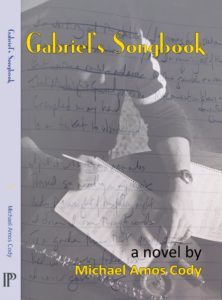 Photo by Ed Huskey, c. 1979.
Photo by Ed Huskey, c. 1979.Just follow one or all of the links below and let me know what you think:
Gabriel’s Songbook at Pisgah Press
Gabriel’s Songbook at Barnes & Noble
Gabriel’s Songbook at Goodreads
Wonder if I’m on Ebay yet. . . . Just checked, and
November 4, 2017
GABRIEL’S SONGBOOK
My first novel, Gabriel’s Songbook, will be available from Pisgah Press on 1 December 2017. You can imagine how thrilled I am about this! It’s something that I’ve long hoped for, and soon I can cross it off my bucket list. But that doesn’t mean I’m finished, because the next item on my list is “publish short story collection,” then record new album, then “publish second novel” — you get the idea. You can go to the website Pisgah Press if you’re interested in preordering (I’ll sign your copy) before the 1 December publication date. (You might want to look at other Pisgah Press titles as well.)
Thanks for reading!
 Gabriel’s Songbook is a living portrait of the artist as a wayward musician, the story of a musician whose talent carries him from the hills of Appalachia to the grime and glamor of Nashville and back home again. Gritty and lyrical, rock ’n’ roll and old-time country, it transports the reader deep into that age-old dream of making the big time, and shows us the beauty and pathos that lurks underneath.
Gabriel’s Songbook is a living portrait of the artist as a wayward musician, the story of a musician whose talent carries him from the hills of Appalachia to the grime and glamor of Nashville and back home again. Gritty and lyrical, rock ’n’ roll and old-time country, it transports the reader deep into that age-old dream of making the big time, and shows us the beauty and pathos that lurks underneath.
Here are kind words from those who’ve read the review copy . . .
What a wonderful book! Artistic ambition, first love, small-town Appalachian life, the image-obsessed machinations of the Nashville music industry: all ring so authentic, so true. Michael Amos Cody’s first novel is gripping, poignant, and unforgettable.
—Jeff Mann, author of Country
I came to care for these characters so much I wished I could step into the book and warn Gabriel and Eliza of the perils ahead of them, or to sit in the audience and hear the searching songs Gabriel sings. Michael Amos Cody shows a care with how his characters speak, and how they interact with one another, that gives the novel both a poetic charge and a lived-in authenticity. Gabriel’s Songbook resonates like a great ballad, a song of love and struggle that keeps chiming in the ears long after the final note is played.
—Jesse Graves, author of Tennessee Landscape with Blighted Pine and Basin Ghosts
Michael Amos Cody writes with the vivid clarity of one who has made it through the punishing Nashville grind and survived, and the passion of a true believer in the power and beauty of the music itself. Behind the glaring lights of Nashville, the late nights, seedy managers and bad deals, is a beautiful tale of redemption and a love story that will stick with you long after the novel is finished. . . . Cody is not just a wonderful writer but a top-notch musician and songwriter as well, and that musicality is in evidence on every page—from the heartfelt lyrics that occasionally punctuate the action, to simple moments like a haircut shared between estranged lovers. This is the best novel of the music business I’ve come across in a very long time.
—Mark D. Baumgartner, Editor, Aethlon: The Journal of Sport Literature
Michael Amos Cody writes with a strong, authentic voice about the Appalachia I know. There is no posturing or exaggeration here. Instead, this is a book that strives after Hemingway’s maxim to write one true sentence, and Cody does that without fail. Gabriel’s Songbook is a novel full of heart and longing and it deserves its distinguished place on the shelf with some of the best stories of the region. I hope it is the first of many more books about Runion, North Carolina.
—Charles Dodd White, author of A Shelter of Others and Lambs of Men
Gabriel’s Songbook by Michael Amos Cody
300 pp. / $17.95
Release date Dec. 1, 2017
ISBN: 9781942016366 / LCCN: 2017946781
Pisgah Press, LLC / PO Box 9663 / Asheville, NC 28815
July 3, 2017
AESU 616 Reunion (#2)
1 July 1979 (Sunday): Day 15
Copenhagen, Denmark – West Berlin
JOURNAL: Rose at 5:45 am then on to breakfast. Left Copenhagen at 7:20. . . . A note about the countryside here (and in France)—gently rolling and very green and now and then the blowing fields are broken by beautifully laid out sections of bright yellow flowers—a beautiful combination. . . . This morning is a little blue, a little rainy, and there was a rainbow. . . . Here we are on the two-hour cruise to East Germany. It is with really mixed feelings that I enter this Communist land; so far everywhere we’ve been has been free. There is a slight element of fear crossing this Baltic Sea. . . . Gulls seem to just hang above me on a string. . . . There’s a dark storm off the bow (starboard) and it’s misting rain a bit here. . . . We made the East German side and finally got the OK to go ahead. The EG countryside very pretty green and rolling but no one seems to live there. About 15 km from West Berlin we got first shock: cobblestone streets through a small German town. The shock—maybe 4 people on the streets, buildings are war torn and in ill repair, seemingly untouched since the war. After we passed through, for the last 5-7 miles to the border of WB, both sides of the road were covered by a massive Russian military camp housing thousands. It also seemed unrepaired from the war. In fact, the whole trip down here was dotted here and there with monuments of red and the red star. The first billboards we saw when we entered the country read “Praise to our Russian Brothers” and “Long Live Socialism.” Along the last 5 miles at odd intervals stood caped Russian soldiers, trying to look inconspicuous while watching the road. There were also a few towers of watch. . . . Another long wait at the border to WB. At least we don’t have to go through what the cars do: seats taken out, headlights, etc. . . . We finally came to the hotel. I’m in room #26 with Gary, Mike, Greg, and Allen. We had a great supper at some soccer-crazy place. Then we hit the disco and I danced all night. It is easy to tell that Michael cares little for East Germany. He always complains about “shitty” cars and roads and people lying! Shaved off beard. . . .
NOTES: 165 k of wall [?]; 16,000 guards
Many of the DDR border guards don’t like what they are forced to do by the Russians. The Russos take away all of DDR industry to help support their other children—DDR knows what it’s like in the West, but Russia has them down for now
1 July (Saturday): Day 2 of Reunion Celebration of 38th Year
San Diego, California
BLOG: In the morning, I walked on the Martin Luther King, Jr., Promenade. I hoped to breakfast at Richard Walker’s Pancake House, but it was too popular. A line of at least fifty folks extended down the block, so I went across the street to Skybound Coffee & Dessert Lounge for an Everything bagel and cream cheese. Then I stopped by Ralph’s, a grocery store in the Kroger family, and picked up three apples for Leesa. Later in the morning the 616ers met in the lobby and caravanned to Torrey Pines State Reserve, where we hiked in the amazing hills above the ocean, walked along the sand below the escarpment (inside joke), and eventually bought lunch from a Japanese food truck and ate on the beach. We went back to the Hilton Gaslamp around 3:00 and got ready for an early supper at Coasterra, a terrific restaurant in a spectacular location at the end of Harbor Island (which, I’m sorry, isn’t an island but a peninsula). We enjoyed after-dinner beverages and bowling at Tavern+Bowl East Village before going back to the hotel. Shaved off beard. . . .
That is a lie.
San Diego is a marvel! But a haunting echo reverberates between the Berlin of thirty-eight years ago, with its infamous and detested Wall, and being here in southern California, just a handful of miles away from what I assume is either the beginning or ending point of Trump’s proposed wall. While many might say that the Border Wall is different from the Berlin Wall, the two walls are essentially the same. Both stand for a shortsighted, even barbaric nationalism that is meant to divide humanity and keep it weak—to separate us from them, separate our souls from ideological systems, hearts and hands from pocketbooks, the forward-thinkers from the meat puppets who holler for dollars.
When we 616ers stood at that wall or passed through the legendary Checkpoint Charlie, we hurt for humanity. But the hope that the wall would one day come down—as it did ten years later, in 1989—and the idea that we might imagine ourselves as one world lived in us and in the stories of those we met at the Wall or on the other side of it.
It might have happened. It almost happened. But it didn’t happen.
Here, in San Diego, as we 616ers stand less than twenty miles from Trump’s wall (will he put his name on it, every 500 meters, in towering gold letters?), we hurt for humanity, knowing that the idea of one world over separate and warring nations will not come to pass, not in our lifetimes at least. And this holds true, I believe, even if the Border Wall is never built. The commitment to the idea of a wall is enough.
[Many of my Christian friends and family will say that we are in this situation because the world has forgotten Christ and thus can do no better than we’re doing. While that might be, it might also be that we have never known Christ. A significant disconnect exists between our supposed faith and the Christ we’re supposed to have faith in. The world need not be judged for having turned from God and Christ; judging is not our job. If we take Christ at his word, we’re to love God with all we are and all we have, and we are to love our neighbors as ourselves. Most of us aren’t good at either of these acts of love. The old song by The Teddy Bears, from 1958, the year I was born, says, “To know, know, know him / Is to love, love, love him.” I’m afraid we don’t “know him,” and that is why we don’t “love him”—he is our God and our neighbor. (See Luke 10:25-37 for the official definition of neighbor.]

